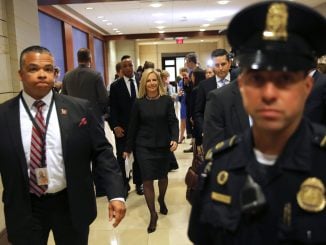RALEIGH — The North Carolina Court of Appeals has granted lawmakers’ motion to stay an order handed down by a 3-judge panel which would permit some 55,000 felons not currently incarcerated to be able to vote in any election.
“The ‘Final Judgment and Order’ entered by a divided three-judge panel of Wake County Superior Court on 28 March 2022 is hereby stayed pending this Court’s ruling on the petition for writ of supersedeas,” the Court of Appeals order reads.
According to the stay order, the state’s board of elections “shall not order the denial of felon voter registration applications received pursuant to the ‘Final Judgment and Order’ but shall order such applications to be held and not acted on until further order of this Court,”
On Monday, Mar. 28, a 3-judge panel voted 2-1 to allow felons to vote, bypassing the state constitution which bars felons from voting “unless that person shall be first restored to the rights of citizenship in the manner prescribed by law.”
“This is an unrivaled attempt by judges to legislate from the bench,” Sen. Warren Daniel (R-Burke) said in a press statement. “Piece-by-piece the courts are chipping away at the legislature’s constitutional duty to set election policy in this state and seizing that authority for themselves.”
The N.C. State Board of Elections (NCSBE) has yet to act, citing an “imminent” appeal in a March 29 memo to county election officials directing them to not yet grant voter registrations for felons.
On March 31, the NCSBE called an emergency meeting on where the board went almost directly into closed session to confer with their legal counsel. Board Chair Damon Circosta issued the following statement:
“This morning, the five members of the State Board of Elections met in closed session with the Board’s legal counsel to discuss the Community Success Initiative v. Moore case. The Board voted unanimously to direct the Attorney General’s Office, the Board’s litigation counsel, to file a response as soon as possible to a pending motion to stay in that case. It will ask the court how to proceed under the trial court’s order. In this response, the Board will establish for the benefit of the court the urgency of the situation and timelines that should be contemplated in light of the April 22 voter registration deadline for the May 17 primary. Any voter registration applications filed by affected individuals are pending. We will take action on those following direction from the court.”
The press release from Senate Republicans called the move a substitution of “preferred policy of two county judges for state law.”
Despite the almost 50 year old law treating all offenders the same, writing in the majority in the 3-judge panel decision, Judges Lisa Bell and Keith Gregory said the law passed by the then-Democratically controlled legislature to deny felons the ability to vote was racist.
“The legislature cannot purge through the mere passage of time an impermissibly racially discriminatory intent,” Bell and Gregory wrote. “The legislature’s decision in the 1970s to preserve [the law’s] denial of the franchise to people living in the community was itself independently motivated by racism.”
The ruling was issued as absentee ballot voting in the primaries had begun and holds to a pattern for this same panel for interrupting elections. The same three-judge panel issued a verbal order to let some 55,000 felons to register to vote as the NC finalized voting materials at the end of August in 2021.
“The people of North Carolina are sick and tired of leftist judges who ignore the law to achieve their desired outcomes. The constitution could not be any clearer: convicted felons are to repay their debt to society before having their civil rights restored,” said Sam Hayes, General Counsel for House Speaker Tim Moore in a statement.
“Granting convicted felons, including rapists and murderers, the right to vote is an affront to every law-abiding voter in our state, and it will not stand,” Hayes said. “We now seek a stay pending appeal to stop this order from going into effect, and we will continue the General Assembly’s fight to preserve the security of our elections.”
In 1973, North Carolina passed a law that dictates how felons can restore their voting access. The requirements to restore citizenship reside in Chapter 13 of the state’s statutes which includes an unconditional pardon or the “unconditional discharge of an inmate, of a probationer, or of a parolee by the agency of the State having jurisdiction of that person or of a defendant under a suspended sentence by the court.”



